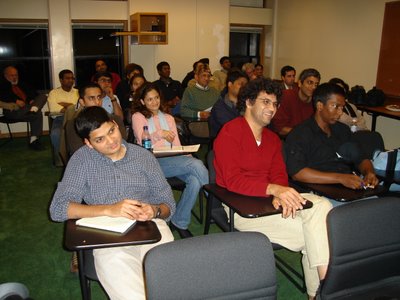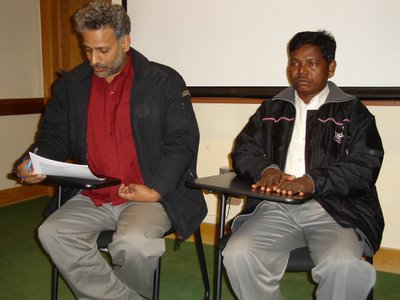Thursday, December 07, 2006

Antinuclear activists from Jadugoda (Uranium mining site in India) are on a US tour. Today the activists spoke at Stanford University.
The following is taken from Friends of South Asia's web site.
-----
India's Nuclear Ambitions:
Who Pays the Price?
Featuring a Film Screening of
Buddha Weeps in Jadugoda (1999)
Followed by a discussion with
Shriprakash (director of the film)
Ghanshyam Birulee and Dumka Murmu - grassroots organizers with
JOAR(Jharkhandi Organization Against Radiation)
Thursday Dec 7, 7pm
Building 200, Room 219
Stanford University
Friday Dec 8, 4pm
20 Barrows Hall
UC Berkeley
Sunday Dec 10, 4pm
Resource Center for Nonviolence
515 Broadway, Santa Cruz
BACKGROUND
The past decade saw India's emergence as a "nuclear power" when it tested nuclear weapons and refused to sign the Non Proliferation Treaty. Earlier this year, India signed a nuclear deal with the US that expands its ability to produce and trade in nuclear energy. Nuclear power is being increasingly touted as a panacea for the exponentially rising demands for energy in India.
However, nuclear energy in India comes at a colossal human cost. Jadugoda, a tribal town located in the mineral-rich East Singhbum District of Jharkhand State, is the only source for Uranium in India, and it has paid a heavy price for it. In this case, those paying the price are adivasis (indigenous people) who themselves are forced to live in a dark world without electricity. Due to the proximity of the mine, a large number of villagers suffer from cancer, skin diseases, physical deformities, blindness, brain damage, disruption of menstrual cycle or loss of fertility. Compounding the problem is the fact that villagers, evicted from their lands, work as miners and are exposed to a heavy dose of radiation. Uranium Corporation of India Limited (UCIL), responsible for operating the mine denies the allegations and refuses to acknowledge the problems - rather, it has been pushing to open new mines in Jadugoda and in other parts of the country.
JOAR ( Jharkhandi Organization Against Radiation)
The native people of Jadugoda have long been resisting the occupation and devastation of their land, their livelihoods, and their health, by uranium mining. They have organized themselves as JOAR--the Jharkhandi Organization Against Radiation. JOAR represents the people of Jadugoda in their efforts to
* Demand better safety measures against radiation
* Demand better safeguards for miners
* Demand protection of their environment and the lives of the indigenous people
* Oppose the construction of new uranium mining projects including planned open-cast uranium mines
The event will feature Ghanshyam Birulee and Dumka Murmu, who are members of the indigenous community in Jadugoda and President and Secretary of JOAR respectively. They are currently visiting the United States in order to participate in the Indigenous World Uranium Summit, being held at Window Rock, Arizona (Nov 30 to Dec 2).






